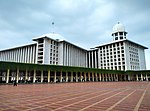
A tariqa is a school or order of Sufism, or specifically a concept for the mystical teaching and spiritual practices of such an order with the aim of seeking haqiqa, which translates as "ultimate truth".

The Padri War was fought from 1803 until 1837 in West Sumatra, Indonesia between the Padri and the Adat. The Padri were Muslim clerics from Sumatra who wanted to impose Sharia in Minangkabau country in West Sumatra, Indonesia. The Adat comprised the Minangkabau nobility and traditional chiefs. They asked for the help of the Dutch, who intervened in 1821 and helped the nobility defeat the Padri faction.

The Qadiriyya are members of the Sunni Qadiri tariqa. The tariqa got its name from Abdul Qadir Gilani, who was a Hanbali scholar from Gilan, Iran. The order relies strongly upon adherence to the fundamentals of Sunni Islamic law.

Al-Sayyid Muhammad al-Hasan bin ‘Alawi bin ‘Abbas bin ‘Abd al-‘Aziz (1944–2004), also known as Muhammad ibn Alawi al-Maliki, was one of the foremost traditional Sunni Islamic scholar of contemporary times from Saudi Arabia. He is considered to be the Mujaddid of 20th-21st century.
Shaikh Ahmad Khatib al-Minangkabawi was a Minangkabau Islamic teacher. He was born in Koto Tuo, Dutch East Indies and died in Mecca, Ottoman Empire. He served as the head (imam) of the Shafi'i school of law at the mosque of Mecca. Many Indonesian Islamic reformist leaders learned from him, including Ahmad Dahlan, who became the founder of the Muhammadiyah Society and Hasyim Asyari, who founded Nahdlatul Ulama in the early 20th century.
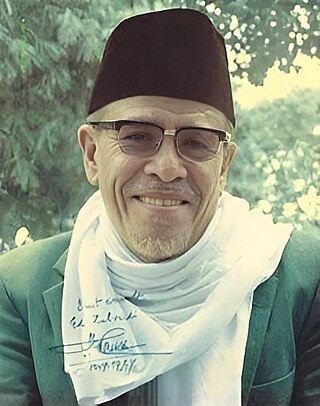
Abdul Malik Karim Amrullah, better known by his pen name Hamka was an Indonesian ʿālim, philosopher, writer, lecturer, politician and journalist.
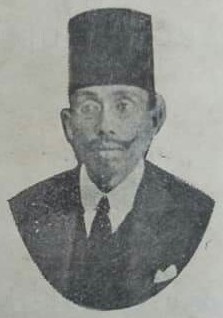
Abdul Karim Amrullah, known as Haji Rasul, was a Muslim reformer who led reformation of Islam in Sumatra, Dutch East Indies.
Khatim al-Awliya' is a work by Al-Hakim_al-Tirmidhi. It was authored around 873. Ibn Arabi later expanded on the notion.
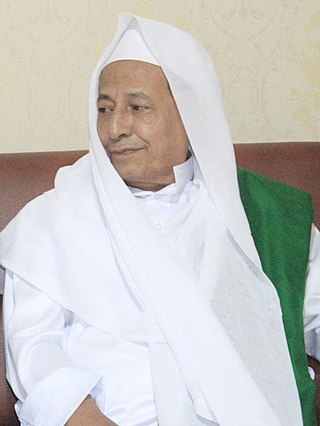
Maulana Al-Habib Muhammad Luthfi bin Ali bin Yahya, colloquially known as Habib Luthfi, is an Arab Indonesian Islamic sheikh, kyai and preacher from Pekalongan, Central Java, who has served as a member of the Indonesian Presidential Advisory Council since December 2019.

Islam is the most adhered religion in West Sumatra, a province of Indonesia, embraced by 97.42% of the whole population. The Muslim population increases to 99.6% if it excludes the Mentawai Islands, where the majority of the non-Muslim (Protestant) West Sumatrans reside. Denomination among Islam in West Sumatra is predominantly Sunni Islam, and there is a small Shia Islamic pocket within the coastal city of Pariaman. Minangkabau people, indigenous to West Sumatra and comprise 88% of the West Sumatran population today, have historically played an important role within the Muslim community in Indonesia. Up until today the region is considered one of the strongholds of Islam in Indonesia.
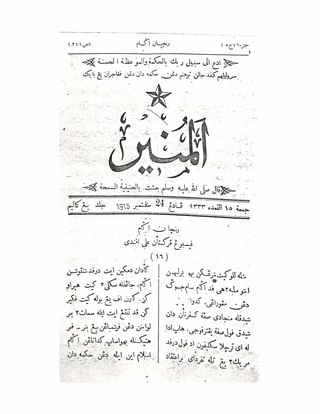
Al-Munir was an Islamic magazine, written in Arabic-Malay, published in Padang from 1911 until 1915. Inaugurated by the initiative of Abdullah Ahmad in early April 1911, Al-Munir was listed as the first Islamic mass media in Indonesia. The magazine was often associated with Al-Imam magazine published under the direction of Sheikh Tahir Jalaluddin in Singapore during 1906-1909. In addition to Abdullah Ahmad, several religious figures such as Abdul Karim Amrullah, Muhammad Thaib Umar and Sutan Muhammad Salim were recorded in the ranks of the editorial board.
Ismail al-Khalidi al-Minangkabawi was an Islamic scholar who belonged to the Khalidiyya branch of the Naqshbandi tariqa in the 18th to 19th century. He hailed from today's Tanah Datar Regency, West Sumatra. He is regarded as the pioneer of the tariqa in Minangkabau region, as well as the whole Indonesian archipelago. He was also known as a scholar of Islamic jurisprudence, kalam theology and tasawwuf.
Tuanku Rao (1790-1833) was an Islamic cleric (ulama), leader and commander. He was known as a prominent padri, a group of Islamic reformists who advocated for the puritanical approach in Islam inspired by Muhammad ibn Abd al-Wahhab in the early 18th century West Sumatra. He also contributed to the proselytization of Islam among Batak people. He died during the Padri War in 1833.
Burhanuddin Ulakan Pariaman, also known as Sheikh Burhanuddin Ulakan, was an Islamic cleric (ulama) from the Minangkabau region. He is regarded as the pioneer of Islamic propagators in West Sumatra. He is also known as a commanding figure of the Islamic movements against the Dutch colonization. Regarding his Islamic belief, he was a Sufi murshid belonging to the Shattari tariqa based in Minangkabau region.
Sumatera Thawalib was one of the earliest Islamic mass organizations in Indonesia, based in West Sumatra. Sumatera Thawalib represented the modernist school of Islam in Indonesia, an Islamic reform with heavy emphasis on the Qur'an, hadith, a modern scientific education, and abolishing of non-orthodoxy. Islamic Modernism was promoted by Muhammad Abduh. The term Sumatera Thawalib literally means "Students of Sumatra", and it was founded on January 15, 1919 as a result of meeting between the Muslim students of Padang Panjang, Parabek and Padang Japang. The aim of the organization was deepening of Islamic knowledge among the Muslim students. The organization had contributed substantially to the development of Islam in West Sumatra in the early 20th century.

Abdullah Ahmad was an Islamic cleric (ulama) and reformist hailed from Padang Panjang, West Sumatra. He is a founder of Islamic mass organization based in West Sumatra, Sumatera Thawalib. He also founded the Islamic magazine Al-Munir, the first Islamic mass media in the Indonesian archipelago. Together with Abdul Karim Amrullah, he became one of the first Indonesians who received the honorable degree from Al-Azhar University in Cairo.
Kampung Padang Balang or Padang Balang is the oldest surviving traditional village in Kuala Lumpur, Malaysia. It was circumferenced by Gombak Road, Jalan Kampung Bandar Dalam, Duta–Ulu Klang Expressway (DUKE), Kuala Lumpur Middle Ring Road 2 and Gombak River.

Union of Islamic Education, also known as PERTI, is a Shafii-Ash'ari Islamic organization in Indonesia. The organization was founded by Sulaiman ar-Rasuli on May 5, 1928 in Candung, West Sumatra. In its development, PERTI had become a political party and gained four People's Representative Council (DPR-RI) seats and seven Constituent seats in 1955 general election.

Minangkabau culture is the culture of the Minangkabau ethnic group in Indonesia, part of the Indonesian culture. This culture is one of the two major cultures in the Indonesian archipelago which is very prominent and influential.

Sheikh Sulaiman ar-Rasuli, known as Inyiak Canduang, was an Indonesian ʿālim and founder of Union of Islamic Education, a kaum tua (traditionalist) Islamic organization from West Sumatra. He was credited for popularizing the famous Minangkabau idiom, adat basandi syarak, syarak basandi Kitabullah.












